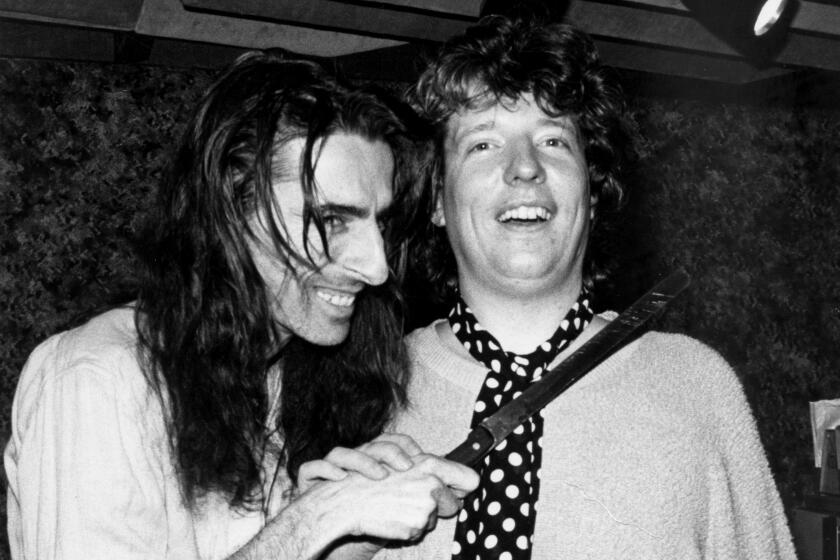POP MUSIC : Blur vs. Oasis : The Battle of Britain : Bitter rivals Blur and Oasis, the two hottest groups on the revived British rock scene, are taking their best shots at the American market--and a few at each other.
- Share via
LONDON — You have to forgive British record executives if they are pinching themselves these days to make sure they aren’t dreaming. Just two years after the once-glorious English rock scene was a shambles because a Nirvana-led wave of American bands had captured the fan allegiance in Britain, that scene is experiencing a rebirth.
Dozens of bands are contributing to this renewed optimism and enthusiasm, but two--Blur and Oasis--stand far above the crowd. They enjoy a popularity so immense and a rivalry so intense that many observers of the English scene say they haven’t seen anything quite like it since, well, the days of the Beatles and the Rolling Stones.
When Blur and Oasis both released singles from their long-awaited new albums in August in England, fans rushed to the stores and bought almost 500,000 copies of them collectively. That pushed the total number of singles sold during the week to 1.8 million--the highest weekly total in England in almost a decade.
British newspapers and pop papers reported on the competition with the breathless, blow-by-blow detail of a championship prizefight.
Blur’s “Country House” ended up edging Oasis’ “Roll With It” for the No. 1 spot on the singles charts, but the inquiry sign was quickly flashed by the Oasis camp after it was learned that thousands of copies of the group’s single didn’t get counted because of a problem with bar coding. The bands add to the sense of combat by frequently taking potshots at each other in the press.
The real test between Blur and Oasis will be in the coming months as their albums compete in the stores both at home and in the United States. Blur struck first in England with “The Great Escape,” which soared straight to No. 1 when released last month. Oasis’ “(What’s the Story) Morning Glory?” is due Tuesday in England and will most certainly battle Blur for the No. 1 spot for months to come. The previous albums by Blur and Oasis have both been in or near the British Top 10 for more than a year.
All this excitement over Blur and Oasis not only signals a renewed faith in British bands in England but also raises hopes of executives on both sides of the Atlantic for another British rock invasion of America.
*
The original British invasion in the ‘60s arrived with such a creative and commercial bang that the momentum carried over into the ‘70s and early ‘80s--thanks to such forces as Led Zeppelin, Black Sabbath, Yes, Elton John, David Bowie, Rod Stewart, the Sex Pistols, the Clash, the Police, the Pretenders and the Cure.
But the English influence in rock came to a virtual stop in the ‘90s. One reason, observers have speculated, is that so many of the British bands of the ‘80s--from Spandau Ballet on--seemed superficial and weightless. They weren’t convincing as either songwriters or musicians. That caused U.S. fans to lose confidence in British music.
By contrast, a new generation of American alternative bands seemed to speak to young people in both America and England with the passion and urgency that once characterized British bands.
Executives are now hoping that enthusiasm for Blur and Oasis--and a parade of other bands including Elastica, Gene, Supergrass and Black Grape--will allow the groups to follow in the footsteps of the Beatles and Stones and the Who in the United States. The Blur album had its American release last week, and the Oasis album is due on Tuesday ( see reviews at right ) .
But don’t expect the often feuding Blur or Oasis to be part of a British rock invasion campaign committee.
“It would be really nice to feel there was some sort of chemistry between our ideas and American audiences because I think we are singing about alienation and sort of end-of-century anxiety, which is relevant in both countries,” says Blur leader Damon Albarn.
“At the same time, I don’t want to be part of the British rock movement--because that implies some sort of take-it-all-or-leave-it proposition, which I don’t think is fair to fans in America or bands here [in England].”
In a rare moment of agreement with Albarn, Oasis songwriter and guitarist Noel Gallagher says in a separate interview: “I will go and play anywhere in the world where we have got fans, but I’m not out to ‘conquer America.’ That’s a pretty pompous thing to say. The reason we go to America is to play for those people who bought our records.
“If we get into the Top 10 or whatever, then great, but it’s not our only ambition. Besides, I think kids in America resent it when a band comes over from Britain, proclaiming it is the next big deal. Our whole approach has been ‘Just take us for what we are--listen to the album for what it is.’ We don’t go over there flag-waving, saying, ‘You should like us because we came from the land of Lennon and McCartney.’ ”
Blur and Oasis are both excellent rock bands with a strong sense of the melodic pop-rock British tradition. While Blur tends to be more poppish than the rock-minded Oasis, both groups offer a wide range of critical and commercial strengths--from the superior songwriting skills of Albarn and Gallagher to the fiendish good looks of Albarn and Gallagher’s brother Liam, Oasis’ lead singer.
Yet the bands are vastly different--a point summarized by the influences cited by Albarn and Noel Gallagher, who supply the bands with their primary visions and who were interviewed separately last spring while recording their crucial new albums.
Albarn, who grew up in an intellectual bohemian family and whose earliest career goal was acting, points to “The Threepenny Opera” composer Kurt Weill as his original musical influence. That helps explain the slightly arty, sophisticated approach of Blur. Gallagher, meanwhile, names the Beatles, the Sex Pistols and the Stone Roses--among others--as inspirations, and Oasis’ music sounds at times like a glorious synthesis of those British groups. Its music is more accessible and everyman in many ways than Blur’s is.
But the bands come together on one point: an admiration for the late Kurt Cobain, whose band Nirvana helped motivate scores of Britain’s ‘90s rockers almost as much as another American, Elvis Presley, helped ignite the ‘60s British rock uprising.
“I think Nirvana was a catalyst for people like myself to get up off our asses,” said Albarn, 27, from the London apartment he shares with his girlfriend, Justine Frischmann of Elastica.
“I think we all lived under the illusion here that there was no one who could touch British music . . . and if the Americans didn’t like us, then it was because they must be stupid--not because we weren’t good enough.
“But then Nirvana and the whole grunge thing came along, and it absolutely captivated the kids here as well as in America. It showed everyone in a band that we couldn’t just rest on the British rock tradition anymore. It presented the challenge of trying to revitalize the British tradition.”
Agreed Gallagher, 28: “At the point they toured with [the album] ‘Nevermind,’ I thought Nirvana was the best band in the world, even though I never got to see them. It pisses me off to this day that [Cobain] shot himself before I could see him. I had a ticket for his gig in England.”
Like most of the promising new British acts, Blur and Oasis may have been greatly motivated by Nirvana, but that doesn’t mean these new bands have adopted the grunge sound. Instead, most of the new English groups have turned to earlier British models for their sounds and, in some cases, their themes.
Elastica, one of the most appealing of the groups, revives much of the late-’70s, early-’80s new wave energy of the Pretenders and the Jam. Gene reminds almost everyone of the Smiths.
“I think people here have found Englishness again,” says Adam King, 28, of MCP Productions, a concert production firm that works with many of Britain’s new bands. “For a while, there was an inferiority complex when it came to English rock. All the good bands seemed to come from America. But now fans here have begun to appreciate once again the quirkiness, the pop sensibility, the English seem to have.”
One of the questions raised about Blur’s ability to build a U.S. following involves this very issue: Englishness. Albarn’s themes are woven around things British in the tradition of such earlier well-respected men of British rock as the Kinks’ Ray Davies and the Jam’s Paul Weller, whose ideas have not always translated easily to American ears.
Despite its huge success in England, Blur’s last album, “Parklife,” has sold fewer than 100,000 copies in the States.
Albarn acknowledges that he writes from the English experience.
“Maybe I need to spend a lot more time in America to reflect more of the experience there,” he says in his usual thoughtful and deliberate tone, when asked about his subject matter, which frequently involves social conformity and convention. “You do need to live somewhere to write about it, and at the moment I live in West London. My American experience so far has been quite limited--most of it from airports, gigs and buses.”
Yet he doesn’t want to lose that English identity--a charge that has been leveled against Bush, a British band that has become a hit in the United States with a sound that is suspiciously American. Not surprisingly, so far Bush has not had any major influence in Britain.
“We never want to be in the position of trying to reproduce an American sound or an American sentiment,” Albarn says. “The thing with Nirvana was the band didn’t pretend to be anyone else. They said, ‘I’m going to sing what I want to sing about, and if you come to it, that’s great.’ That’s what I loved about Nirvana. And that’s what ‘Parklife’ was about. It was our response, in a way. I never wanted to be Nirvana, but listening to the band made you want to make the best of yourself.”
Blur should benefit in this country from its switch from SBK Records, best known for lightweight pop acts such as Vanilla Ice and Wilson Phillips, to Virgin Records, home of alternative-rock heroes Smashing Pumpkins. The band will be at the John Anson Ford Amphitheatre on Oct. 10 as part of a brief U.S. swing.
Oasis’ debut album, “Definitely Maybe,” didn’t set the U.S. charts on fire, but it fared far better than the Blur album, selling nearly 600,000 copies, thanks to two promotional tours and the MTV and radio exposure gained by its enchanting “Live Forever.” As typified by that single, much of Oasis’ music celebrates rallying against odds--an optimism and determination that separate much of the new British rock from the relentless anger and aggression of ‘90s U.S. alternative rock. Oasis is expected to tour the West Coast in December.
One reason Oasis may have enjoyed more success in this country than Blur is that its themes tend to be more easily absorbed.
“We aren’t singing about high-rise flats in London,” says Gallagher, who grew up in a working-class family in Manchester and never wanted to be anything other than a rock star. “We are singing about cigarettes and alcohol and following your dreams and everyday life, and that means as much to people in Denver as people in London.”
Chris Lycett, executive producer of live music for BBC Radio, believes that Blur and Oasis signal the beginning of a new era in British rock.
“What Nirvana did was restore attention on the guitar and the singer and the words, rather than the haircuts and fashion in this country,” he says. “For a while, British bands seemed to just come and go without giving you much reason to care about them. But there is a feeling now that things are different. You listen to these bands, and you realize that they will be stayers.”
More to Read
The biggest entertainment stories
Get our big stories about Hollywood, film, television, music, arts, culture and more right in your inbox as soon as they publish.
You may occasionally receive promotional content from the Los Angeles Times.










